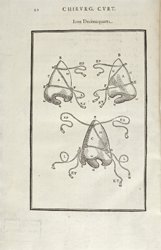If George W. Bush were to discover a cure for cancer, his critics would denounce him for having done it unilaterally, without adequate consultation, with a crude disregard for the sensibilities of others. He pursued his goal obstinately, they would say, without filtering his thoughts through the medical research establishment. And he didn't share his research with competing labs and thus caused resentment among other scientists who didn't have the resources or the bold--perhaps even somewhat reckless--instincts to pursue the task as he did. And he completely ignored the World Health Organization, showing his contempt for international institutions. Anyway, a cure for cancer is all fine and nice, but what about aids?There is much more in the article. Read the whole thing here.
No, the president has not discovered a cure for cancer. But there is a pathology, a historical pathology, that he has attacked with unprecedented vigor and with unprecedented success. I refer, of course, to the political culture of the Middle East, which the president may actually have changed. And he has accomplished this genuinely momentous transformation in ways that virtually the entire foreign affairs clerisy--the cold-blooded Brent Scowcroft realist Republicans and almost all the Democrats--never thought possible. Or, perhaps, in ways some of them thought positively undesirable. Bush, it now seems safe to say, is one of the great surprises in modern U.S. history.... [Most American liberals] are not exactly pleased by the positive results of Bush's campaign in the Middle East. They deny and resent and begrudge and snipe. They are trapped in the politics of churlishness.
The achievements of Bush's foreign policy abroad represent a revolution in the foreign policy culture at home....
What the Bush administration gradually came to realize was that fighting the Muslim terrorist international could not be done in a vacuum. If the Islamic and Arab orbits were to continue to revolve around sanguinary tyrannies, there would be no popular basis in civil society to rob the cult of suicidal murder of its prestige. So, rather than being a distraction from the struggle against the armed rage suffusing these at once taut and eruptive polities, confronting their governments was actually intrinsic to that struggle. The Bush administration recognized that removing the effect means removing the cause....
History has never traveled in the Middle East as fast as it has during the last two years. In this place where time seems to have stopped, time has suddenly accelerated.... Whatever the proper historical and cultural analysis of the past, however, the fact is that democracy did not begin even to breathe until the small coalition of Western nations led by the United States destroyed the most ruthless dictatorship in the area....
The fine fruits of the Bush administration's indifference to international opinion may be seen now in Lebanon, too.... Suddenly, the elections in Iraq, Bush's main achievement there, exhilarating and inspiring, sprung loose the psychological impediments that shackled the Lebanese to Syria....
None of this happened by spontaneous generation. Yes, there were lucky breaks: Yasir Arafat died, Syria conspired somehow to have former Lebanese Prime Minister Rafik Hariri assassinated. And yes, the new directions are young, and the autocratic-theocratic political culture of the Middle East is old, and it is once again too early to proclaim that the mission has been accomplished.... But the mission is nonetheless real, and far along, and it is showing thrilling accomplishments....
So the situation is certainly complex. But complexity is not a warrant for despair. The significant fact is that Bush's obsession with the democratization of the region is working....
One does not have to admire a lot about George W. Bush to admire what he has so far wrought. One need only be a thoughtful American with an interest in proliferating liberalism around the world. And, if liberals are unwilling to proliferate liberalism, then conservatives will. Rarely has there been a sweeter irony.
UPDATE:
Pat Sajak, one of the more intelligent figures in show biz, has a nice take on Peretz' article in Human Events Online. He thinks that the article "could [possibly] lead to a major shift in American political discourse."
Sajak writes:
It seems to me we have been in a rhetorical arms race in this country, with each side unwilling to lay down its weapons for fear -- usually justified -- the other side would beat them to a pulp. The idea of giving credit where credit is due has gone out of fashion.Read it here.
It’s obviously too soon to announce a new dawn in the world of political debate, but if we can restore even a bit of civility and common sense, we will be better and stronger for it. And we can tip our hats to Martin Peretz.
Not bad for a showbiz guy, eh? If you are interested in more of his writings check out this site.














